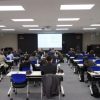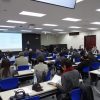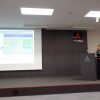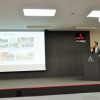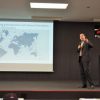On Friday, December 2, UNIDO ITPO Tokyo organized a plant tour to Mitsubishi Fuso Truck and Bus Cooperation (MFTBC) for a diplomatic delegation from developing countries in Tokyo. 17 embassies participated in the program.
On a beautiful December afternoon, 20 representatives from 17 embassies in Japan got on a bus heading its way to the Kawasaki Plant / Research & Development and Purchasing Center of Mitsubishi Fuso Truck and Bus Cooperation (MFTBC). MFTBC is part of Daimler Trucks, the world’s largest truck manufacturer and the Kawasaki plant is the largest FUSO truck plant, manufacturing light, medium and heavy duty trucks for Japan and export markets.
Representatives from Kawasaki city, MFTBC, Mercedes-Benz Japan, and Daimler AG Representative Office Tokyo welcomed the delegation with a presentation from each department. In response, H.E. Ambassador Gabriel Duque of the Republic of Colombia commented that the visit turned into an opportunity to learn the competence of Kawasaki city especially for its consideration for environment. H.E. Ambassador Chingiz Aidarbekov of Kyrgyz Republic followed to express that he sees that the achievements by MFTBC are model of the Japanese industrial technology.
The delegation was then led to walk through the plant, which was fully refurbished in 2014. In a production line close to 600m long, 22.5 light duty trucks and 8.6 medium and heavy duty trucks are produced every hour. The operation with dynamic movements and swift actions were almost too quick to follow. In the first half of the production line is an area for “kitting”, which has all of the small parts set according to the vehicle in production fully intact, ready for assembling. In the latter half of the line, light, medium and heavy trucks are assembled, first the engine followed by the drivers’ seat, fuel/oil/cooling gadget, and the tires. “It is fascinating that the production line is accurately operating”, commented a participant from Nepal. “There is not a single drop of oil on the floor”, was the comment by the representative from Ghana who also emphasized the importance of technology transfer and that “an effort to bring a production line for new vehicles in my country is on its way”. The representative from Indonesia, on the other hand, was keen to hearing future plans for factory launch in her country. Despite a variety of interests and diverse situations in each of the countries, the interest and trust towards Japanese technology seemed to have been something that was shared among the participants.
This was the third plant tour organized by UNIDO ITPO Tokyo to MFTBC. As the plant installs new automation combined with the “karakuri kaizen” or the Japanese innovation/improvements based on devices that mainly rely on gravity, annually, the visits, remain “fresh” even in the eyes of those have previously been at the plant.
Participating Embassies:
Bolivarian Republic of Venezuela, Cambodia, Democratic Republic of the Congo, Federal Democratic Republic of Nepal, Gabonese Republic, Kyrgyz Republic, Republic of Angola,
Republic of Botswana, Republic of Colombia, Republic of Ghana, Republic of Haiti, Republic of Honduras, Republic of Indonesia, Republic of Iraq, Republic of Paraguay, Republic of the Philippines, The State of Qatar



